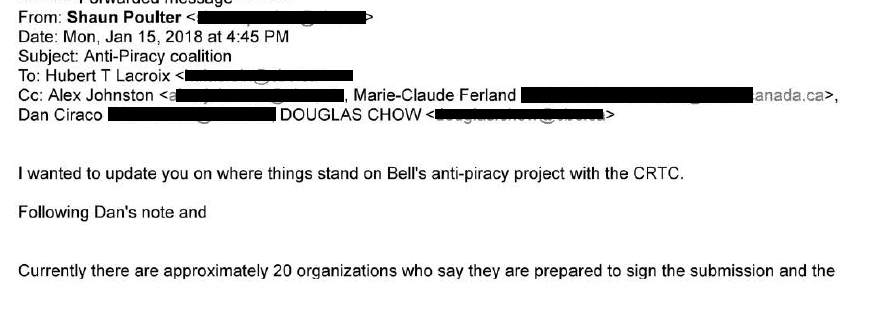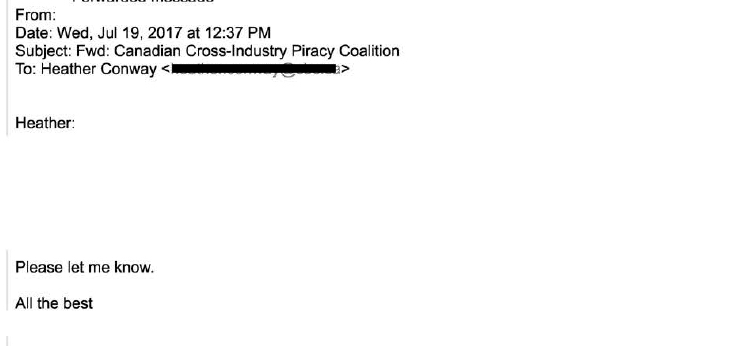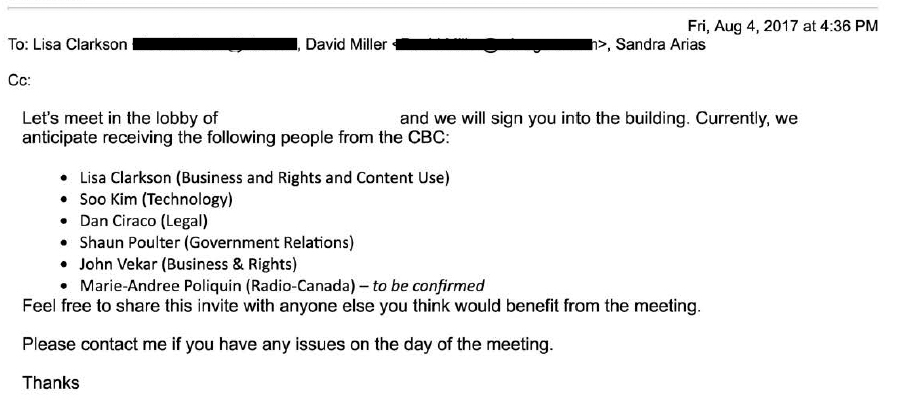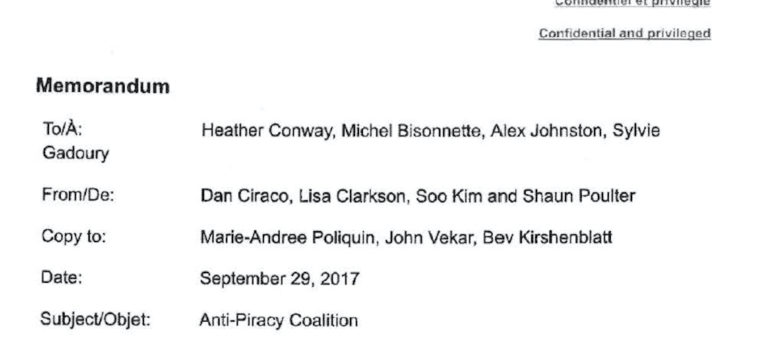Bell’s behind-the-scenes effort to drum up support for its site blocking proposal at the CRTC has been the subject of several posts over the past few months. Based primarily access-to-information requests, I’ve identified Bell pressure on universities and colleges such as Ryerson University, George Brown College, and Brock University, who all submitted support letters to the CRTC, though those letters were not always quite what they seemed (Brock University quickly distanced itself from the submission, the Dean behind the Ryerson letter advised Bell that he could not speak for the faculty). Earlier posts also highlighted Bell’s astroturfing campaign with its own employees and its undisclosed meetings with CRTC officials months before the proposal was made public.
This post adds one more piece to the puzzle: how did Bell work to convince other companies to join its coalition? For that answer, I filed an access-to-information request with the CBC, the only coalition member subject to those laws. CBC’s participation in the site blocking coalition was always an outlier. I noted in a post on its participation that:
CBC may justify its support for site blocking as a matter of principle, but in doing so it jettisoned other important principles that Canadians might have expected their public broadcaster to support. By adopting a position that it would prioritize blocking Canadians who try to access its programming, the CBC is outlier when compared to other public broadcasters who have worked to overcome blocking mandates around the world.
In fact, it turns out that concerns with the CBC’s participation was shared by some involved in the decision-making process. For example, CBC’s Executive Director of Public Affairs and Government Relations, commenting in a heavily redacted email string, plainly advises CBC’s Vice-President, Strategy and Public Affairs, that “this really isn’t our fight, and it will cost us.”

Poulter email, obtained under ATIP
The executive also described the coalition as the “Bell anti-piracy project” in an email update to CBC President and CEO Hubert Lacroix two weeks before the formal filing at the CRTC.

Bell anti-piracy project, obtained under ATIP
The records obtained from the CBC are heavily redacted with thousands of responsive pages left largely blank due to a myriad of exceptions for legal advice and commercially sensitive information. However, the records do provide several hints at how things unfolded. First, Bell approached potential participants in the summer of 2017, around the same time as it was working to secure an advanced meeting with the CRTC. An email request went to Heather Conway, CBC’s Executive Vice-President, English services, with responsibility for all English-language services, on July 19, 2017.

Conway invite, obtained under ATIP
Conway forwarded with message to CBC’s Executive Director of Business & Rights and Content Optimization with the suggestion that executives from digital operations and government relations also participate. That quickly led to an introductory call and a broader meeting with additional CBC personnel. The meeting was not limited to Bell as one email identifies Rogers’ Chief Legal Officer as one of the participants at the same meeting.

August meeting, obtained under ATIP
Over the months that followed, CBC held additional meetings and began to develop its internal position on the issue with regular correspondence with Bell (there is heavy redaction but some emails include Bell contact information or references to being at the company). Senior CBC management, including President and CEO Hubert Lacroix, were often included in the correspondence and were well aware of the issues associated with the site blocking proposal. Moreover, the CBC participated in monthly Skype-based meetings among all participants organized by Bell to advance the proposal.

Cross industry meeting, obtained under ATIP
Once the potential filing came closer in December 2017, the CBC developed a Q & A document that sought to justify the participation. Consistent with the leak that led to a story in Canadaland and resulting media coverage, the focus of the media lines was on the proposed “Internet Piracy Review Agency.” Those media lines would resurface once the filing formally occurred in January 2018. The CBC has remained largely silent since the filing, responding only the occasional media request for comment.
The CBC’s participation was always difficult to reconcile with the public broadcaster support around the world for net neutrality, media freedom, and public access. Further, the CBC might prefer that viewers use authorized services, but supporting blocking is a counter-intuitive position for a public broadcaster as it tries to stop Canadians from viewing the content they paid for through their tax dollars. Internal documents now suggest that executives at the highest level were involved in the process from the very beginning and well aware of the concerns.








Unbelievable1
How can an institution supported by the public purse side with a private company that wants to decimate net neutrality by getting the CRTC to tolerate site blocking and thus boost its own revenue?
This entire site blocking business stinks.
It’s called Corporatocracy.
Sorry, I don’t have time to translate my comment, but I think the deplatforming of Alex Jones (and other lesser names, either on the left and on the right) is a prelude for instoring internet wide site blocking…
Ok, hypothèse: les GAFAM ont banni Alex Jones (et d’autres moins gros noms) pour qu’il aille sur Mastodon et Peertube… pour après présenter l’argument: “Voyez, il faut réguler le trafic internet”. Ne rigolez pas, ici au Canada les grosses Cie (et la télé d’état!) tentent de faire adopter un règlement afin de pouvoir bloquer (à leur guise) les sites de leur choix… because copyright et bientôt because alt-right.
Pingback: Internal Reluctance Expressed for CBC Joining Fairplay Canada
When Access to Information gives you no information I assume it is acceptable to fill in the blanks:
Heather,
Have you tallied all of the bribes we’ve accepted from the Fairplay group?
Please let me know.
All the best
Why the *&^&% is the author of that empty email redacted? This needs to be in front of a Judge or Federal Inquiry panel who can access all the details.
top entertenment
if it goes through im canceling internet , m done with this nazi agenda these people are pandering to…its all about greed and control…im gonna take what i can and go enjoy it …
and you idiot its not corporate anything the proper term is PLUTOCRACY….
here is to trump making canada not want to sign and i hope they keep the house cause then we will be giving notice to leave nafta and these shit for brain artists will be the last things on everyone’s mind as we all scramble to eat shit and live
musicans , actors and hollywood and games industry , giving you loot boxes , drama over rape and substence abuse and perfect role models for kids….HEY I KNOW lets gve these bastards more time to do all that so society can be horrifiied more….
get woke go broke…trek s near dead, same with star wars , all the big franchises are going stupid …and everyone is waking up….
perhaps its good
very good and helpful
https://pooyasystem.com/
Pingback: To fix Canadian copyright, let creators claim their rights back after 25 years | Give Info
Pingback: "Free is not fair" would possibly not make authors richer, however solving publishers' contracts will / Boing Boing - Latest News from CNN, BBC